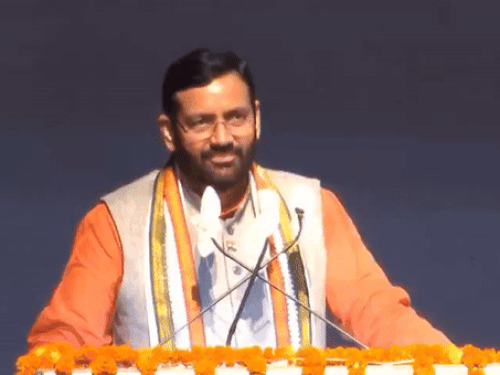- Hindi news
- National
- Waqf Act 1995 Controversy; Supreme Court vs Center States | CJI Br Gavai
New Delhi48 minutes ago
- Copy link

The Supreme Court on Tuesday issued a notice to the Central and State Governments on a petition challenging the provisions of the Waqf Act, 1995. The court also questioned the petitioner and asked why they were challenging the 1995 Act in 2025. Should it be heard?
The bench of CJI BR Gawai and Justice Augustine George Christ was hearing. It was said on behalf of the petitioner that the 2013 Waqf Amendment Act has also been challenged in the court. On this, CJI said that it is also getting delayed 12 years. The petitioner’s counsel said that the Supreme Court is also hearing about the Placeage of Versep Act 1991.
The Supreme Court associated the petition with an old petition challenging the 1995 Act. This petition has been filed by Law Student Nikhil Upadhyay. His petition has been associated with the petition of Parul Kheda and Harishankar Jain.

Demand to cancel the provisions of 1995 in the petition Nikhil Upadhyay, in his petition, has demanded the cancellation of various provisions of the Waqf Act, 1995 as unconstitutional. His petition states that only Muslims have a law related to the administration of their donations. Other religions have no such law. Hence the Waqf Act, 1995 is discriminatory.
The petition also states that despite the amendment, various provisions of law are violating articles 14 and 15, which gives the Muslim community the right to grab the property of government and non -Muslims.
Additional Solicitor General Aishwarya Bhati, who is presenting the Center, told the bench that the court has not allowed a hearing with petitions challenging the 2025 amendment to the petitions challenging the 1995 Act. Therefore, he has no objection to linking this petition with other petitions challenging the 1995 law.
History of Waqf Board The British government formally launched the Waqf Board in 1913. The Waqf Act was enacted in the year 1923. The Waqf Act was passed for the first time in Parliament after independence in 1954. The Congress government of PV Narasimha Rao made a change in the Waqf Act 1954 after the Babri Masjid scandal in 1995. After this change, the Waqf Board got a lot of powers under this law.
- Now there was so much strength in this law that according to section 3 (R) of the Waqf Act 1995, if the board considers any property as Pakistan (Holy), Jharahabi (Religious) or (Charitable) Philanthropist, then that property would be of Waqf Board.
- If someone objected to this decision, then he can plead with Waqf. According to Article 40 of the Waqf Act 1995, whose land is this land, it will decide only the surveyor and Waqf Board of Waqf.
- If someone objected to the decision of the Waqf Board, then he can go to the Waqf Tribunal to settle the dispute related to his property. One special thing about this law is that the final decision on land or property is taken in the Waqf Tribunal itself. According to section 85 of this law, the decision of the Waqf Tribunal cannot be challenged in civil, revenue or other courts.
- In 2013, the UPA government of the Congress changed the laws and rights of the Waqf Board by further enhancing their powers and rights. This time, a geographic information system (GIS) mapping was arranged to monitor Waqf properties across the country. So that the correct and accurate record of the properties can be kept. Also, it was taken care that there was no external pressure or intervention on the board.
,
Read these news related to Waqf …
Hearing in Supreme Court on Waqf law, Center said- Waqf mention in Islam, but not an essential part of Islam

The petitions challenging the validity of the Waqf (Amendment) Act were heard in the Supreme Court on 21 consecutive day. On behalf of the Center, Solicitor General (SG) Tushar Mehta told the court that no one can have any right on government land, even if it is on the basis of ‘Waqf by user’. If any land is government, then the government has full right to take it back, even if it has been declared as Waqf. Read full news …
The Muslim side said- if the changes in the Waqf law are implemented, then there is no compensation for the loss; Court said- bring strong arguments for relief

During the hearing on the petitions challenging the new Waqf law on May 20, the Center said that there are a total of three issues, which have been demanded to be banned and we have filed a reply on it. Hearing on these issues should be limited. Counsel for the petitioners Kapil Sibal said that there are not just three issues. There is an issue of encroachment on the entire Waqf. The government cannot decide which issues should be raised. If the provisions are implemented then it will be difficult to compensate for the loss. Read full news …




